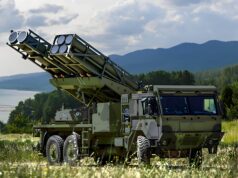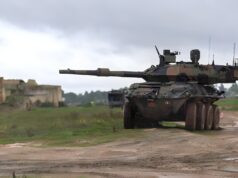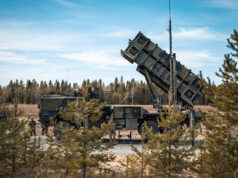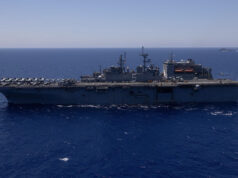Since 2014, defence spending on the continent and in Canada has increased. In 2014, only three NATO allies met the 2 percent of gross domestic product on defence guideline.
This year eight allies should hit the mark, and by 2024 there should be 15.
“All NATO allies have put forward plans to increase spending in real terms,” alliance chief Jens Stoltenberg said.
“This is major progress and it is a very good start. But we still have a long way to go and hard work ahead.”
He noted that after the United Kingdom leaves the European Union, 80 percent of NATO’s defence spending will come from non-EU allies.
Stoltenbeg also said that merging EU and NATO assets of the European allies will be crucial for defence.
“If the EU actions complement NATO and are not seen as an alternative, then I see great potential for improving European security,” he said. “That is why a closer NATO-EU cooperation is vital.”
Stoltenberg also discussed what he called “the re-emergence of nuclear challenges.”
After the Cold War, the alliance placed nuclear issues on the back burner, but Russia’s modernisation effort, Iran’s nuclear program and North Korea’s emergence as a nuclear nation placed it in the forefront once again.
“Let me be clear, our goal is a world without nuclear weapons, but as long as they exist NATO will remain a nuclear alliance,” the secretary general said.
“A world where Russia, China and North Korea have nuclear weapons, but NATO does not, is not a safer world. That is why the ultimate guarantee of security is the strategic nuclear forces of allies, particularly those of the United States.”
Stoltenberg said the world may be more dangerous and unpredictable now, but he feels conflict is not inevitable.
“To preserve the peace, we need the military strength of the alliance, combined with the political courage to seek dialogue, to deescalate, reduce tensions and find peaceful solutions to our differences,” he said.











I support PESCO, but I totally agree it has to work together with NATO to be effective and not disruptive in any way.
Counter-productive, that’s the word I wanted.
What a telling statistic that is. So basically the EU funds just 20% of its defence ….
So how does the EU think PESCO will work when the Germans (the country that owns and runs the EU) can’t get it own tanks, ships, submarines and aircraft to work when asked? And the French senior General resigns in protest at their own forces being cut? As for the rest? Well lets not go there ….
EU countries have been happily freeloading off the USA and the UK for decades. The EU commission prances round the world gobbing off about how big it is and how big its GDP is when the EU itself is nothing. It is a combination of nation states. And because they failed to listen to one of its biggest members it is about to lose 14% of its GDP, 13% of its ‘market’ and 17% of its income
So if they couldn’t afford to meet NATO standards before how will they do it now? PESCO is a competitor to NATO and we cannot have both. The UK needs to pay lip service to European security in public but quietly disentangle itself from EU machinations and avoid being sucked in to their defence. Hard lessons need learning … After all it wasn’t the UK that wound up the Russian Bear over Ukraine was it? No that was the EU playing global politics …
Either EU alliance will thrive or NATO will thrive. There is no room for both.
One alliance is already dysfunctional enough. How will 2 work?
** Correction: That was a comment not a reply **
Totally agree Chris (defence not politics :-)). For instance at 1.22% of GDP defence budget but running a surplus of 1.2%, Germany is a distinct laggard, yet leads the EU-27 in many ways. What they should do is immediately reverse the spares budget cut and accelerate it, to be in a sound position by 2020, and up to 1.6% at least of GDP, with a total commitment to the 2% by the target date of 2024. I’m actually genuinely shocked at this:
“This year eight allies should hit the mark, and by 2024 there should be 15.”
No, it shouldn’t be 15, it should be all 28, excepting perhaps just 1 or 2 that can plead special circumstances.
But, if PESCO can work to share resources and maximise defence spend, specially for smaller members, perhaps it will give more incentive. You can only hope.
Blimey. So the EU has 47% of NATOs population but only spends 20% of its defence budget.
Says it all really about the EU, not exactly trustworthy reliable tough allies we have there.
I think probably the only decent fighting force in the EU are the Dutch marines and the Polish Army.
russia lost the cold war because it couldn’t afford it. if we beat them by outspending them before, we can do it again.
Denmark’s pretty contributory in terms of navy, and France has a bit of a similar problem to the UK in that the rest of the EU shelters under its umbrella as well as ours.
In terms of defence spend as % of GDP, apparently Greece spends more than the UK, Estonia the same, Romania and Poland slightly less, and others nearly as much as France.
https://www.nato.int/nato_static_fl2014/assets/pdf/pdf_2017_06/20170629_170629-pr2017-111-en.pdf
I think Greece’s defence spending is at least as much concerned with its fractuous relationship with Turkey as its commitment to NATO, and probably more.
Greece barely counts. Their military funding remains above 2% because their fucking economy shrank by 25%
And Germany horrible mismanages their military funds. Like their force is a budget closer to 20 billion, not 36 billion.
Are so you are forgetting about the Finns and Swedes? Not NATO but defo EU and both would put up a fight.
Defence spending is like an insurance policy, no one what’s to buy more cover than you actually need but on the other hand you don’t want a cheap policy then find when you need to make a claim your not adequately covered.
Defence spending can be a force for good, not only for your own direct defence but in also assisting poorer nations with mentoring training and supply of surplus equipment to ensure they can maintain there own defence and internal security to prevent the rise of terrorist groups who may threaten our interests.
My own view is that defence spending in times of peace should be 3% of GDP, this would enable us to have a robust defence policy and assist others.
This would be funded by DFID, cuts to welfare spending and elimination of tax evasion/avoidance.
I reckon post Brexit we might get a free trade deal with China. Russia should have been offered free trade and NATO membership years ago. That would of de-escalated tensions and made them an ally rather than a potential foe.
Would Putin have got into power and remained there as long if we had tried to develop the peace at the end of the cold war?
Missed opportunity, now yes we should have 3% GDP to defence by cutting foreign aid, ruthless efficiency savings in civil service and government and really nailing procurement programmes for the military.
Also agree tax avoidance and the dark ” cash in hand economy” is said to be worth 25-30% of GDP. Ever had a plumber, electrician or other contractor that wanted paying in cash?
Russia was offered nato membership, but declined.
Declined after western countries namely the UK, and Germany and later the US made supportive statements of Chechnya. While Federal forces were engaged in suppressing a rebellion. The US would repudiate any sympathies for the Chechen cause after 9/11. However by then Putin was in power and the opportunity was lost.
Nato & the EU are not synonemous. The EU members of Nato won’t even contribute the minimum 2% GDP(ours is cebateable too) their defence yet expect to create an Eu army, which may detract fom NATO commitments. Nato has kept the peace in Europe, not the EU.
Turkeys intollarence of internal dissent & cosying up to Isis & Russia is a major concern.
80% without the UK, just how much with the UK, guessing maybe 79.5% or higher.
uh?!. I don’t understand
In essence Steve is asking what percentage of NATO spending is down to the U.K.. The article tells us that with the UK’s percentage subtracted from the EU slice of the funding pie chart and added to the non-EU slice the percentages become 20%/80% so, as I understand the question, it is – while the UK’s percentage still remains in the EU slice of the pie chart, as it will until March 2019, what does the pie chart look like? Are we actually contributing a meaningful percentage or is everyone’s contribution so dwarfed by the USA’s that the shifting of the UK’s contribution is actually very small and it just so happens that it is enough to tip the balance over the round number 20%/80% mark?
[…] Read Full Article: After the UK leaves the EU, ’80 percent of NATO spending will come from outside the EU’ says all… […]
Steve what??? I think our defence budget probably equates to circa 18-21% of the total EU nations defence contributions. Depends on how you define our defence budget. I mean there is a huge amount of creative accounting going on in the MOD but the fact the armed forces pensions are lumped into the core defence budget is ridiculous.
highly unlikely. don’t forget NATO includes the US; which alone contributes close to 73% of NATO spending. UK is about 7% of the total and Germany around 4%.
Reality is take US out of NATO and there is no NATO.
Oops – I should really read to the end of the comments before replying but I guess my premature reply above was correct although I see now that the discussion had moved on in that direction anyway.
[…] View Reddit by smsjohnson – View Source […]
It is my belief that the EU is only interested in it’s own super state, and the only reason for a european army is to solidify their position for super statehood.
They already dictate the terms on which the rest of the world deals with them in terms of trade and judicial aggreements, and once they have their own EU military force, they will view NATO not as a partner but as another entity to negotiate with, and if NATO doesen’t comply with its terms it will not be aloud to operate on EU soil… I really do hope that is not the case and that I am being overly sceptical, but the EU have shown time and again that its their way or the highway.